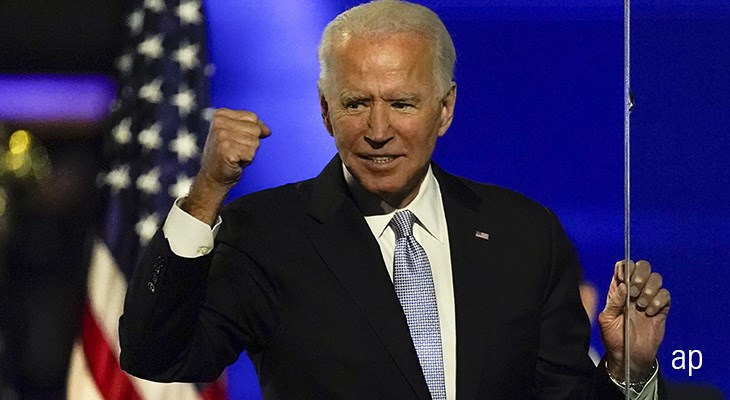
With Joe Biden announced as the winner of the US Presidential Election over the weekend, what should we expect going forward? Global equities rallied on Monday morning as investors reacted to the end of the uncertainty that saw the election result delayed for days.
As ever, politics matters – particularly as it looks likely that Republicans will hold on to the Senate, denying Democrats the “clean sweep” to push through their ambitious programme of change.
The key question for investors is what changes a Biden presidency/Republican Senate scenario could bring. Biden's platform proposed major new spending programmes, including healthcare, clean/renewable energy, infrastructure, and education, among others. However, Biden's ability to institute most of these major policy changes is going to be very limited without Democratic Senate control. The Republican Senate majority will set the agenda, and so even if a handful of Republican senators are amenable to Biden's proposals, it will be an uphill battle for any major Democratic legislation to even see the Senate floor.
We think the experience of 2010-16 is instructive (when Barack Obama was President, but the Republicans held the House, and later the Senate as well): Congressional Republicans are likely to stay disciplined in denying Biden significant legislative victories.
A handful of Democratic policy priorities can be accomplished solely through executive action, and we expect a potential Biden administration to pursue these regulatory avenues. With that said, Biden's executive authority might end up limited compared with Obama's, thanks to potential new Supreme Court rulings around the power of the administrative state.
Below, we'll discuss the implications that policy changes could have on sectors, companies, and ultimately investors. We'll focus on the scenario of a Biden/Republican Senate victory. Although it may be prudent to consider making a few modest changes in your portfolio, we recommend focusing on your long-term investment goals.
Corporate Taxes
Equities rallied after the election, likely reflecting the reversal of market fears that we'd see a large corporate tax hike if the Democrats achieved a clean sweep. We agree that such a tax hike would likely have occurred in that scenario, which could've caused a negative impact to after-tax earnings on US equities in the high single digits. However, with Republicans looking likely to hold on to the Senate, we doubt we'll see a corporate tax hike. From that standpoint, the broad uptick in equities looks logical. Following the rally, we think stocks are generally fairly valued; however, we note this valuation is upwardly skewed by several mega-cap stocks that we think are overvalued. For long-term investors, we continue to see the most opportunity in small- and mid-cap stocks especially in the value category.
Fiscal Stimulus in Jeopardy
With either a Donald Trump win or a Biden/Democratic Senate clean sweep, we had been very confident in the prospects for a massive stimulus bill being passed in 2021, perhaps around $1.5 trillion to $2.0 trillion (or 7% to 10% of US gross domestic product). The details of the bill would have varied depending on which scenario occurred, but it would have included some mix of support for small businesses and those who remain unemployed. The Democrats would've also included heavy funding for state and local governments whose finances have been adversely affected by the coronavirus pandemic.
However, we doubt that the Republican Senate will allow another massive stimulus bill with the prospects of a Biden presidency, as Biden will essentially own the economic track record as of January 2021. We could see a smaller bill ($500 billion or less), but even that's not guaranteed.
Fixing Covid is Still Key
Nevertheless, in our base-case economic outlook, we don't think the lack of further stimulus is a fatal threat to the recovery. We covered this recently in "We Still Expect a Strong U.S. Economic Recovery." In our view, Covid-19 vaccines remain a much more pertinent issue for the economy than further stimulus. And assuming that we'll see broad vaccination in the United States in the first half of 2021, as we project, the economy will be in good shape without further stimulus.
If we were to see greater stimulus, that would modestly accelerate the recovery in GDP without changing its long-term trajectory. Long-term Treasury yields will also move higher with greater stimulus; dimming hopes for a stimulus likely caused the decline in US 10-year Treasury yields on Wednesday morning.
A large stimulus package may also propel the price of gold higher in the short term and could push out our midcycle price forecast for gold. However, we continue to forecast that gold prices will come back down to earth once demand starts to cool.
Gold-mining companies could see a short-term pop, but we think that the companies under our coverage are overvalued, as most have Morningstar Ratings of only 1 or 2 stars.
Healthcare Changes?
Major changes to the US healthcare system look unlikely if Biden wins but the Republicans hold the Senate. We expect a Biden administration to pursue initiatives that expand the insured population in the US, but we doubt we'd see policy changes that meaningfully change our valuations in the healthcare industry. The Affordable Care Act could be partially expanded through executive actions in the Biden era. However, it's also possible the Supreme Court could strike down the ACA. For further detail, see "Which Healthcare Policy Scenarios Remain Possible."
A public option looks very unlikely given Republican Senate control, but in any case, the implications of a public option for healthcare stocks would probably be slight. The impact of a public option would be limited to the individual exchanges as opposed to employer-sponsored insurance, according to our analysis. We expect that any shifts from employer-based insurance would be limited to very small employers that are unable to negotiate the same price discounts with insurers as larger employers, based on our projected pricing of a public option. We think the market is undervaluing firms in the managed-care organization sector, though healthcare stocks rallied as fears of major policies eased.
Changing Course on Climate
The more sweeping changes for climate/energy policy outlined in Biden's platform would require legislation, and as such they look unlikely with Republican Senate control.
With that said, there are some actions that Biden can take with the executive branch. Biden will seek to halt permitting for drilling new wells on federal land, although this will exempt the bulk of US oil production. Vehicle fuel efficiency standards would likely be increased. We covered the implications of these policies for energy stocks in "U.S. Oil and Gas Doesn't Need a Trump Win to Thrive." Altogether, the policies won't change our outlook for oil and natural gas prices, and so most energy companies won't see an impact. For exploration and production companies with significant acreage on federal land, the drilling ban could have a moderate impact on fair values (around 12% to 14%).
A Push on Renewable Electricity
A prospective Biden administration doesn't change the ongoing trend: renewable energy will continue to grow as a percentage of electricity production and will become the second-largest source of power generation in the US by 2030, according to our forecasts. We foresee that growth of renewable power will increase 8% annually based on state-level renewable energy policies as the primary growth driver as opposed to federal regulation.
Biden's energy platform calls for the US to reach net-zero emissions by 2050, but the majority of US utilities have already made this pledge. The most obvious beneficiaries are those utilities that already own a significant amount of their own, or are supplied by, renewable energy assets.
Growing Cannabis
A potential Biden administration now has the chance to turn the campaign pledge to decriminalize cannabis into policy. We think motivation for further easing the federal prohibition could follow.
Banks and other ancillary services have stayed away from servicing cannabis companies because of legal risk. These companies' stocks are currently limited to trading on the over-the-counter market and Canadian exchanges. Decriminalisation could prompt US markets to allow these stocks to trade on US national exchanges. This change would allow cannabis companies greater access to the capital markets for growth.













.png)








